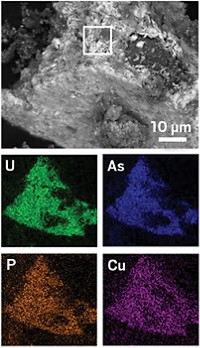Advertisement
Grab your lab coat. Let's get started
Welcome!
Welcome!
Create an account below to get 6 C&EN articles per month, receive newsletters and more - all free.
It seems this is your first time logging in online. Please enter the following information to continue.
As an ACS member you automatically get access to this site. All we need is few more details to create your reading experience.
Not you? Sign in with a different account.
Not you? Sign in with a different account.
ERROR 1
ERROR 1
ERROR 2
ERROR 2
ERROR 2
ERROR 2
ERROR 2
Password and Confirm password must match.
If you have an ACS member number, please enter it here so we can link this account to your membership. (optional)
ERROR 2
ACS values your privacy. By submitting your information, you are gaining access to C&EN and subscribing to our weekly newsletter. We use the information you provide to make your reading experience better, and we will never sell your data to third party members.
Environment
Spreading Resistance During Wastewater Treatment
ACS Meeting News: Heavy metals promote the spread of antibiotic resistance in treatment plant microbes
by Michael Torrice
March 28, 2011
| A version of this story appeared in
Volume 89, Issue 14

When people pop antibiotics to treat infections, the drugs often end up excreted into sewage. As scientists continue to find these antibiotics in the wastewater coming from homes and hospitals, they worry that the drugs' presence is fueling the spread of antibiotic resistance. At the American Chemical Society meeting in Anaheim, Calif., researchers reported that wastewater contains other chemicals that might also promote antibiotic resistance: heavy metals.
Environmental scientists have previously observed a connection between metals and antibiotic resistance in metal-contaminated soils and freshwater sediments. The bacteria living in these environments had significantly higher levels of resistance than bacteria from noncontaminated soils.
Edward F. Peltier of the University of Kansas, Lawrence; David Graham of Newcastle University, in England; and their colleagues wondered if the phenomenon also occurred in wastewater treatment plants. These plants are a unique environment where, along with antibiotics, metals such as zinc and copper are common. Bacteria also play a key role in the treatment process. After removing solids from wastewater, treatment plants mix it with a sludge containing an array of bacteria that chew up dissolved organic compounds.
Peltier and his team simulated that process, called activated sludge treatment, to determine whether metals could spread antibiotic resistance. They constructed lab-scale versions of the sludge reactors from inverted 4-L glass bottles with their bottoms cut off. Each reactor started with water containing a mix of organic molecules and other nutrients commonly found in wastewater, along with bacteria from wastewater samples collected from a nearby treatment plant.
After allowing the bacteria to grow, the researchers put their collection of minireactors through three experimental phases. In the first phase, they monitored baseline levels of antibiotic resistance in the sludge bacteria. The scientists next added metals, either copper or zinc, to some of their reactors and monitored any changes in resistance. For the third phase, they added one of three antibiotics to each reactor. Throughout the experiment, the researchers monitored the levels of dissolved organic material to ensure that the reactors were running efficiently.
They found that copper alone, in the absence of antibiotics, could promote resistance to the antibiotic ciprofloxacin, with resistance levels jumping from a baseline level of 7% of the reactor population after the first phase to 11% after the second phase. Zinc alone didn't have an effect, but in the presence of certain antibiotics it did enhance resistance levels. In reactors receiving zinc and tetracycline, 63% of the bacteria were resistant to the antibiotic. Meanwhile, resistance levels in reactors that received tetracycline and no metal were only 44%.
If metals do help spread antibiotic resistance in wastewater treatment plants, then they could be a more long-lasting source of resistance than are antibiotics themselves, Peltier says. "Antibiotics can degrade, metals can't," he says.
Rolf U. Halden of Arizona State University, Tempe, calls the study "a great example of how environmental engineering and environmental chemistry intersect with a major issue in human health." He thinks that the results raise questions about how we deal with industrial wastewater, which contains significant levels of metals. Treatment plants often mix this water with domestic sewage, bringing antibiotics and metals together. Removing metals from industrial wastewater before it reaches these plants could minimize the problem, he says.





Join the conversation
Contact the reporter
Submit a Letter to the Editor for publication
Engage with us on Twitter